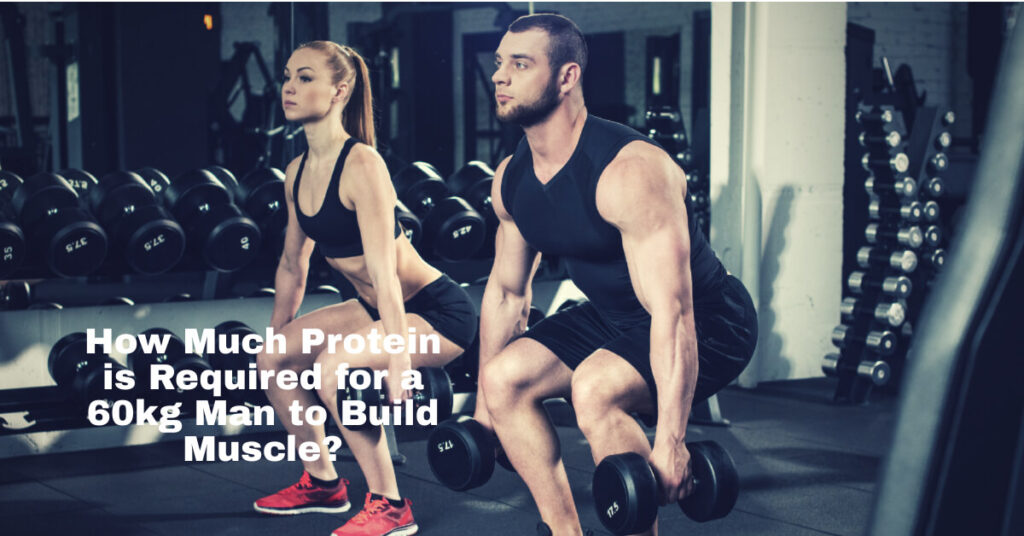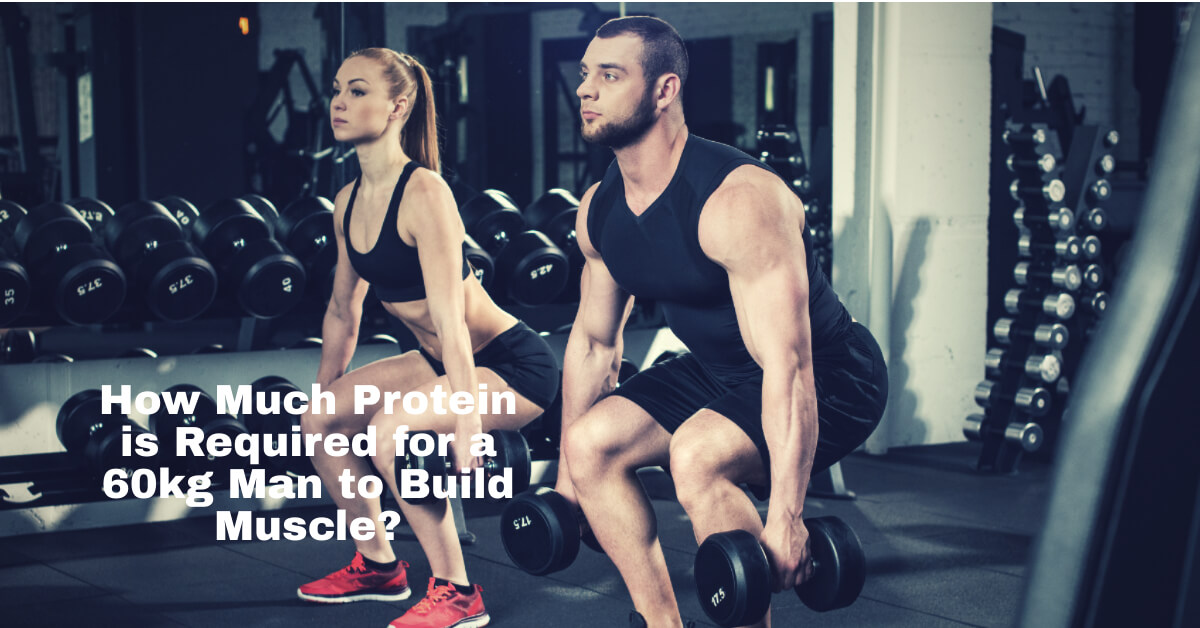“How Much Protein is Required for a 60kg Man to Build Muscle? The Ultimate Guide to Muscle Growth”When it comes to building muscle, protein is a critical nutrient that plays a vital role in muscle repair and growth. As a 60kg man aiming to build muscle, you may be wondering exactly how much protein is required to achieve your goals. Protein intake is one of the most important aspects of any muscle-building plan, but how do you determine how much protein is necessary for your body weight? In this article, we’ll break down how much protein a 60kg man needs to build muscle, the factors that influence your protein requirements, and how you can optimize your protein intake for muscle growth.

Why Protein is Crucial for Muscle Building
Before we answer the question, “How much protein is required for a 60kg man to build muscle?”, it’s essential to understand why protein is so crucial for muscle growth. Proteins are made up of amino acids, which serve as the building blocks for muscle tissue. When you engage in resistance training, such as lifting weights, your muscles experience small tears. Protein helps repair and rebuild these muscle fibers, making them stronger and larger over time.
Without enough protein, your body won’t be able to repair muscle fibers effectively, which could slow down or even reverse your muscle-building progress. In addition, insufficient protein intake could result in muscle loss, especially if you’re training hard but not providing your muscles with the nutrients they need to grow and recover. Therefore, getting the right amount of protein is key to achieving your muscle-building goals.
How Much Protein Does a 60kg Man Need to Build Muscle?
Now, let’s address the main question: How much protein is required for a 60kg man to build muscle? The general guideline for protein intake for muscle growth is 1.6 to 2.2 grams of protein per kilogram of body weight. This range is ideal for most people who are trying to build muscle mass. Since you weigh 60kg, we can calculate your ideal protein range as follows:
- Lower end (1.6g per kg): 60kg x 1.6g = 96g of protein per day.
- Higher end (2.2g per kg): 60kg x 2.2g = 132g of protein per day.
Therefore, a 60kg man looking to build muscle should aim for 96 to 132 grams of protein per day. Your ideal protein intake will depend on several factors such as your training intensity, fitness goals, and overall diet. But based on the general guidelines, this is the range you should target to maximize muscle growth.
Factors That Influence Protein Requirements for a 60kg Man
While we’ve established a basic protein range for a 60kg man, several factors can influence how much protein you truly need to build muscle. These factors include your training intensity, fitness goals, and individual metabolism. Let’s take a look at some of the key elements that can affect your protein requirements:
- Training Intensity and Frequency: If you’re lifting heavy weights or engaging in high-intensity training multiple times a week, your protein needs will be higher. Intense training leads to more muscle breakdown, which means your body needs more protein to repair and build muscle fibers. On the other hand, if you’re doing light exercises or training less frequently, you may not need to consume the higher end of the protein range.
- Fitness Goals: Your protein intake will vary based on whether your goal is to build muscle mass or maintain your current muscle level. If you are trying to significantly increase muscle size, you should aim for the higher end of the protein range. If you’re only looking to maintain your muscle while losing fat, you may be able to get away with a lower protein intake.
- Age and Gender: Age and gender can also influence your protein requirements. Older adults may require slightly more protein to support muscle maintenance and growth due to changes in muscle protein synthesis. As a male, you may also require slightly more protein than a female with a similar body weight due to having more muscle mass.
- Metabolism: People with faster metabolisms burn more calories and may require more protein to maintain muscle mass. If you find that you have a high metabolism and tend to lose weight or muscle quickly, increasing your protein intake could help prevent muscle loss and promote muscle growth.
- Dietary Considerations: If you follow a vegetarian or vegan diet, you may need to consume more protein-rich plant-based foods or supplements to meet your protein needs. Unlike animal-based proteins, plant-based proteins may not always contain all the essential amino acids, so it’s important to combine different plant protein sources to ensure you’re getting a complete amino acid profile.
How to Distribute Protein Intake Throughout the Day
While knowing how much protein is required for a 60kg man to build muscle is important, how you distribute that protein intake across the day is just as crucial. Research suggests that spreading your protein intake throughout the day, in several meals, is more effective for muscle growth than consuming all of your protein in one sitting. This method helps maintain a steady supply of amino acids in the bloodstream, ensuring that your muscles have what they need for repair and growth.
Ideally, you should aim to consume around 20-30 grams of protein per meal. For a 60kg man, this would mean eating protein-rich meals 3-4 times per day to meet your total daily protein requirement. For example:
- Breakfast: 25g protein (e.g., eggs, oatmeal with protein powder)
- Lunch: 30g protein (e.g., chicken breast with quinoa)
- Dinner: 30g protein (e.g., fish with brown rice and vegetables)
- Snacks: 10-20g protein (e.g., protein shake, Greek yogurt)
By ensuring that your protein intake is evenly spread throughout the day, you can optimize muscle protein synthesis and prevent muscle breakdown.
Best Sources of Protein for Muscle Building
The quality of the protein you consume is just as important as the quantity. High-quality protein sources, such as animal-based proteins, provide all the essential amino acids needed for muscle growth. Some excellent sources of protein include:
- Chicken, turkey, and lean beef: These are high in protein and provide all the essential amino acids for muscle repair.
- Fish: Salmon, tuna, and other fish are packed with protein and also contain healthy fats, which can aid in recovery.
- Eggs: Eggs are a complete protein source, meaning they contain all nine essential amino acids.
- Dairy: Greek yogurt, cottage cheese, and milk are rich in protein and provide calcium, which is essential for bone health.
- Legumes and beans: Lentils, chickpeas, and beans are great plant-based protein sources.
If you’re following a plant-based diet, you can get sufficient protein by combining different plant-based foods to create a complete amino acid profile. Foods such as quinoa, tofu, tempeh, and seitan are excellent sources of plant protein.
Protein Supplements: Are They Necessary?
While whole food sources should always be your primary focus for meeting protein needs, protein supplements can be a convenient and effective way to boost your intake. For example, whey protein is a popular supplement that provides a quick and easily digestible source of protein after a workout. Casein protein, on the other hand, digests slowly, making it an ideal option before bed to help with muscle repair overnight.
If you’re struggling to meet your protein goals through food alone, protein powders or bars can help you bridge the gap. However, it’s always best to prioritize whole food sources of protein for their additional vitamins, minerals, and other nutrients.
Conclusion: How Much Protein Is Required for a 60kg Man to Build Muscle?
To summarize, a 60kg man looking to build muscle should aim for 96 to 132 grams of protein per day, based on the general recommendation of 1.6 to 2.2 grams of protein per kilogram of body weight. Your protein intake should be adjusted based on your training intensity, fitness goals, and other individual factors like metabolism, age, and gender.
Distributing your protein intake across multiple meals throughout the day, ensuring you get quality protein sources, and possibly incorporating protein supplements can help you optimize muscle growth. Remember, protein is just one part of the muscle-building equation, and for best results, it should be combined with a balanced diet, effective training, and proper rest.
By following these guidelines and consistently hitting your protein goals, you’ll be well on your way to building muscle and achieving the results you desire.

